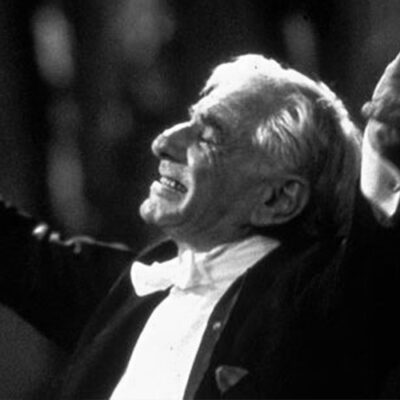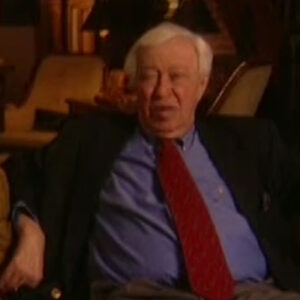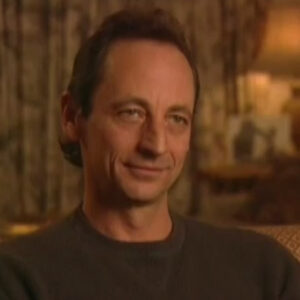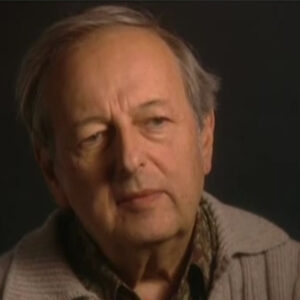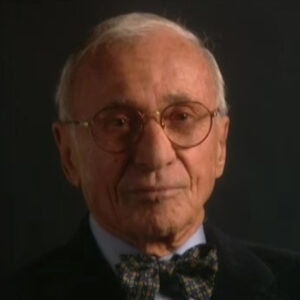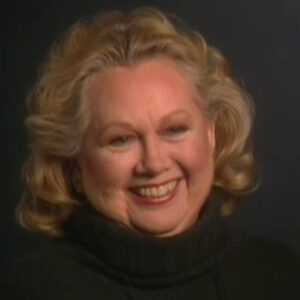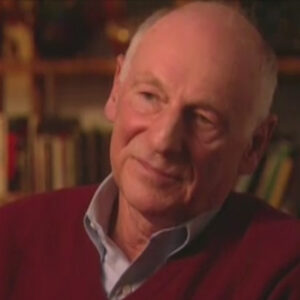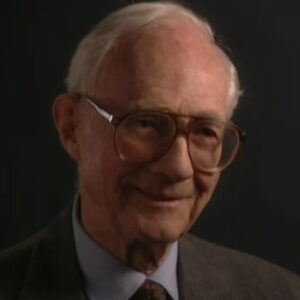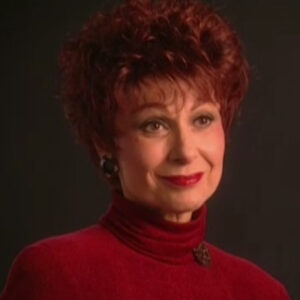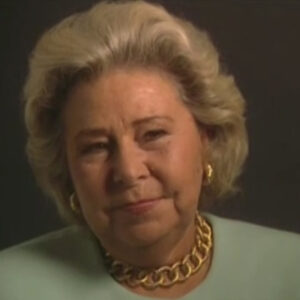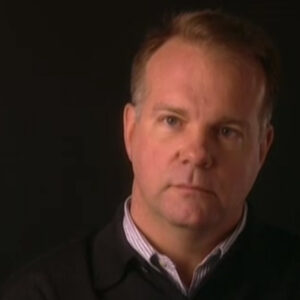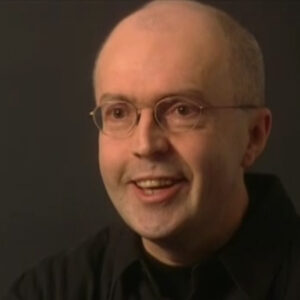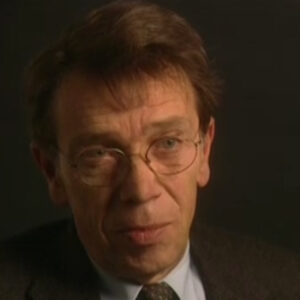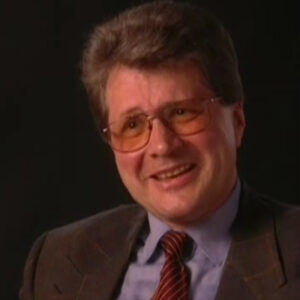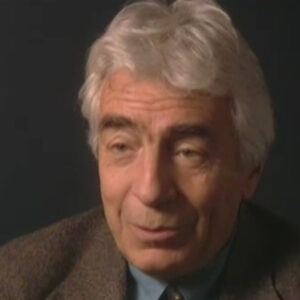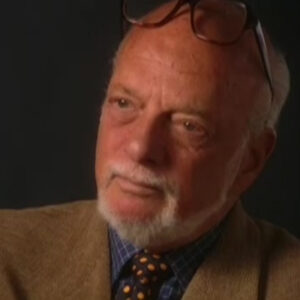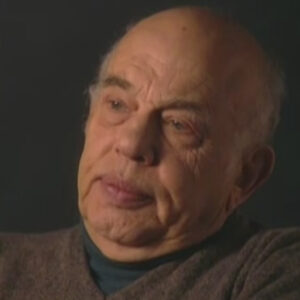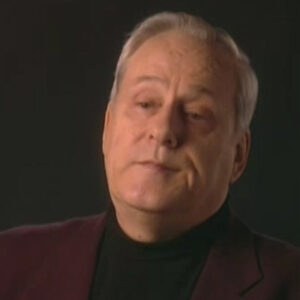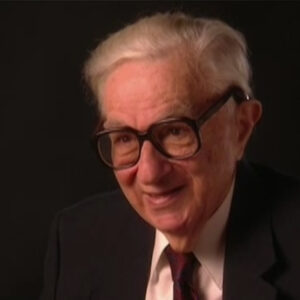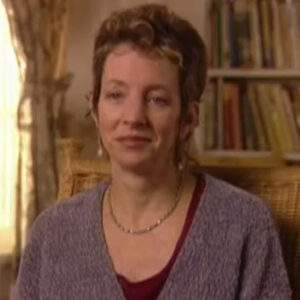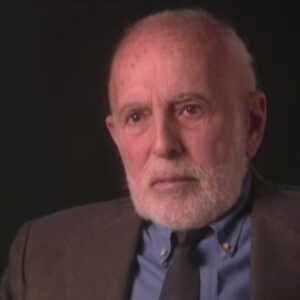Speaker So the first thing I’d like to do is to describe once again how you heard the debut, where you were and you heard on the radio and you said, oh, yes, yes.
Speaker Oh, yeah. Well, let me not let me end of an hour in California sharing an apartment with Judy Holliday and another member of our act, the reviewers, it was above a stenographer published sonographers office on the Brayer, very depressing place.
Speaker And we were listening to the radio, not acutely, but just it was on the background on Sunday afternoon and was the Philharmonic. And we heard the music and it sort of filtered into our consciousnesses.
Speaker And we both sort of stopped and said, it doesn’t sound like Bruno Walter, who was a conductor. And we listened more and we said, well, it must be. And then at the end of the piece, there was this announcement.
Speaker And they said for the first time, the young assistant conductor, Leonard Bernstein, and we just jumped up and down, we were so excited and thrilled that we had heard this and had a feeling it wasn’t wasn’t Boulevard.
Speaker We couldn’t possibly have dreamed that it was Lenny. And we were just leaping around the apartment in jubilation. It was such a thrill. And those days you didn’t get on the long distance phone that easily. Not with our income anyway. And I don’t think we call them. We got in touch with them later, but it was a great, great moment. Yeah, we always knew it would happen.
Speaker Like they like to go in to talking about.
Speaker Oh, yes, how I danced. Yes.
Speaker And maybe you could just, I think actually don’t.
Speaker Lenny has well, actually, to start with, Lenny had started working with Jerry Brown. Yeah, yeah.
Speaker And just just tell the fancy free story, particularly the story about how you were sitting in the box and you noticed that the jukebox. Oh, that. Yeah, I played it. Mm hmm.
Speaker Well, yeah, I was I was in New York. My husband had come in on leave from the army and I had met and we’d been together for ten days. I had left California to meet him and then he was gone. And around that time, Lenny was working with Jerome Robbins and I went over to his apartment to hear this new work he was working on. So I heard fancifully on the piano first and then it went to rehearsal and it was very exciting. And then they all came to New York and we were sort of groupies.
Speaker We’d go down to the met with. They were rehearsing and hang out and watch them. We were so excited about it. Then opening night we were sitting and it must have been the third ballet listed. And we noticed we had found out that that it opens with a scene in the bar, of course, and there’s a jukebox playing and it opens with the song Big Stuff coming off the jukebox. And it came to our attention that?
Speaker S your presenter had not provided them with any way to play a record on stage. And so I remember going leaving the Opera House during one of the ballets and running up to my apartment, which was on the west side and near where I live now, and getting this sort of portable table model phonograph that I had gotten from my husband as a present and carving it down to the Met and pulling, you know, they put it on stage and just in time really for the ballet to start so you could hear the opening strains of big stuff. And there was my little phonograph singing on stage for that that momentous event. And the credit for that. No, no, nothing. Nothing, really.
Speaker With some big stuff sung by Billie Holiday, just just like.
Speaker I just want to wait a minute to be the opening night. It wasn’t Billie Holiday, was it? I think it was Shirley Bernstine. Singing Big Star, yeah.
Speaker Billie Holiday later recorded it and was used from then on, so we just skip that.
Speaker Yeah, I thought it was. I think so, check that with Adolf.
Speaker Yeah, I don’t think the signal one made a record yet. I mean, these were two unknown kids who put together this thing.
Speaker You know, it wouldn’t get Billie Holiday that easily.
Speaker Now, during fancy free, he had already been named the assistant conductor of the New York Philharmonic and was kind of working on Fancy Free while he was carrying out those duties. Yeah, and you could just kind of give a little summary of what happened. As I understand it, he was working on fancifully. The debut had already happened. Yeah, Rochinski was beginning to be a little jealous of all the attention that Lenny was getting. Yes. Yes. And began to make it very difficult for him. And Lenny eventually resigned. Yeah. And a couple of months later, fancifully opened.
Speaker That’s the story that children you need to get with. So, yeah, flares. Did we go into that? No, I need to have that. Yeah, I see. That’s why Lenny was writing when he was writing Fancy Free or it had opened already and was playing. No, no.
Speaker He resigned from the market two months later. For you. Yeah. But he was having a difficult time with graduate school. Yeah. He was getting all the attention. We’re just beginning to get very jealous of that story. We were just practically strangled him. Yeah.
Speaker I don’t yeah, I shall be very honest, I don’t know. I mean, this is before he stepped in, you know, after. Oh, oh sure.
Speaker Picked him. Yes. And with the famous story of God told me to pick Bernstine. And the next day when he’s most famous in the world, who became an atheist right away.
Speaker And he started to get very jealous.
Speaker I mean, to the point where I mean, let me tell you a story that he in Texas of Dragunov. Yeah.
Speaker Which didn’t seem to be a new thing for Lenny. I mean, if you remember, Curtis, we were stopped by one of the students, brought a gun out the teacher’s pet. So, I mean, Lenny can’t seem to evoke the strong emotions through, but it was pretty clear that Rochinski was going to make it very difficult for Lenny to.
Speaker Carry on. Go off to do something for free. Make the day he’s not carrying out his death. Yeah, the lady beside me.
Speaker And that’s kind of a big step because she’s saying, you know, I composition’s that position. Yeah. Yeah. So I need a transition.
Speaker Oh, I see. Yeah. Racialize. Mm hmm.
Speaker Well, while Lenny was composing fancifully at the same time, he was still assistant conductor of the Philharmonic under Radzinsky, who had picked Lenny and started out, you know, thinking he had done a great thing. But right after this, Lenny had stepped in and become the most famous name in music. And little by little, Radzinsky was very sorry about his choice. And he got more and more jealous and more and more angry about it to the point where at one instance he actually tried to to strangle and sort of put him out of the way completely. And so Lenny got very uncomfortable and he was not comfortable pursuing his composing career because he said he’s not paying attention to his conducting. And so after a spell of this, Lenny just decided to resign and then shortly after fancifully opened.
Speaker You know, that was amazing as she it and she shall we see what else happened, our collaboration talk a little bit about the process of collaborating with Lenny. Because you have all these other duties to perform.
Speaker Yeah, well, some some of it was very broken up in time because it would go off on these conducting giants. And Helen Coats, who was his right hand foot and everything he did was not too happy about Lennie going into the popular field and doing a show. So whenever we tried to get him, we always had the obstacle of Helen Cotes, you know, how do we get an appointment with our collaborator with Lenny? So some of it was very broken up. I remember the first thing with the first lyric we wrote was for the taxi song, I think Come Up to my place. And we wrote out a whole lyric. We didn’t usually do this with Lenny, but he was away and we wrote the whole lyric. And then when Lenny came back from wherever he was, you know, he says it. And then when he was away another time, we looked through some music that he had already written songs. And we found to that were, you know, extraordinarily beautiful. And we found places in the show and to have the right idea for them. And that one was lucky to be me and the other was Lonely Town. And we wrote lyrics to the existing music, which is the opposite process. And Lonely Planet came in and we tentatively, nervously showed him the and he was sort of taken aback. And he said to you, that’s good, you know? And so we had to work that way sort of in an improvised way. But then there were other times that we were close and we did things by spontaneous combustion in the same room and things happened that way. And the last song in the show, some other time was, I think written last we knew we wanted something.
Speaker To at the near the end about the parting of the various couples, and we somehow found the right idea and we were in the same room, I think writing it writing was a little apartment with Shirley Bernstein lives to this day, sister.
Speaker And we we found, we thought just the right thing. We’re very happy about it. And we were already about to go out of town. So, Lenny, there was a scene where there was a snowy winter night in Boston, and it was an odd sight for people coming down the street, coming down the comments, because we were in the window of a music store on the corner and our coats and mufflers was freezing. And Lenny at the piano and he was teaching everybody some other time. And the harmony in the second chorus we were rehearsing there, you know, Adolf and I were in the show, so we had to both be writing and writing by day and and performing at night. And it was a short time, but it was only ten days till that carried away story. How that evolved. Yeah, well, I laugh and I played two characters who were rather explosive and expansive and unpredictable people. And he was one of the sailors. And I played the lead, the anthropologist Clair de Lune, and they were attracted to each other because of this combustible quality that they both had. And we were trying to find the right. Words for that, how to express it, and the phrase carried away came to mind and we decided we would use that and now we get the idea to L.A. and we welcome the words to the little first bump. I try hard to say control, but I got carried away and then Lenny started to sell it to music and they said, that’s no good. That sounds so Rikki Tikki. So that doesn’t sound like me. So we said, well, try it in minor. So took the same tone and de da dee da da da dee dee in minor the verse and it was perfect. And then he said this should be operatic because the best way to express extreme emotions beyond human is opera.
Speaker And so he, he wrote the music to be operatic, can’t work out very out of control. And yeah, that’s that’s how that number happened.
Speaker In the last interview, you talked a little bit about being shy, about showing Lenny your work because you were.
Speaker We’re going to go back to the chances. Yeah, you were relatively new and he was already.
Speaker Yeah. You tell the story. Yes, well, we did feel tentative at the beginning because Adolf and I had we had never written either the book for show or the lyrics to ballads and songs with emotion in the review is our act. We did satirical material sketches and lots of songs too, but they were all of a satirical nature that was not one shred of real human feeling in them. And so we were now writing a story, a book and also the songs to express emotion. And we were very tentative about it because we didn’t know if we’d make it. We thought we might be replaced in a minute. There seemed to be people warming up and bullpen’s all over to replace us in case we flopped. And it was a very big strain. But, you know, Lenny was was our champion. And so we felt a little uneasy. As I said, like presenting are our setting of a lonely town or something. Uh, we felt comfortable as soon as he said he approves. Yeah. And he made us feel very good. Well, after the success of fancifully, two young producers, all of us, Smith, who was an extraordinary stage designer as well, and another young producer named Paul five, they got together and decided Jerry and Lemmy should do a full length show. And Lenny said he knew just the people to write the book. And lyrics offend me, although all he knew of us was our performing and nightclub act reviews. But he was such a fan of that he felt we could do it. And so we got together. It was not specifically to be an extension of fancifully, but while we was trying to think of, you know, the idea for it and we thought, know three Bessarabia or three, I don’t know, we didn’t know what it would be. So and then finally decided we wanted it to be about New York. And we thought the idea of one day in New York, all the dualities, this and it seemed good to have three sailors was wartime comfort. But the story is completely different from fancifully. There’s no connection with it on the town as these three boys who’ve never been to New York from various parts and the United States audiences get off the ship and they’re in New York for one day. And we sat down with Oliver Smith and made a list of locales, you know, Coney Island, the subway, the park, you know, Times Square, and said, no, we have to travel by the story and go to all these different places that we can show New York. And that was kind of the guideline for what we wrote and that we saw these shows three boys trying to cram a lifetime into 24 hours. And that’s how the how the idea evolved.
Speaker Interesting stories that you told last time about the casting of it that you were looking for a cross section of New York and which meant having blacks and whites together and that you hadn’t realised until later that you find yourself as pioneers. But the first time that actually. Yeah, yeah. Uh oh.
Speaker Well, the casting I mean, it seemed it was going to be about New York and there’d be scenes and the subway of the population. And so naturally we wanted ethnic representation of all kinds of people. And it didn’t occur to us that this was a groundbreaking idea, that we had blacks and whites on the stage at the same time dancing together and singing together. And it was only pointed out it was later that this really hadn’t been done before. And we know it just seemed like really this is New York. So these are the kinds of people that you have, because that’s the New York population. And I mean, it worked out wonderfully. I think we have four black dancers and four black singers and the singers played all kinds of little parts. I mean, one of them was a policeman. And there were no black policemen then. And a little and there was a thing where where, uh, George Abbott, after he picked Lonny Jackson, said his name was to be the policeman who said you’ll have to wait up for that. You know, and, you know, this sort of Taurima went through the theater we took to decide later. We said, George, you know, you can’t say things like that. George is a man without prejudice, without guile. And he said, oh, I mean, you know, we back up to play. Why wouldn’t he? Why do I mean, it was so simple in his mind. And it was it was just a great, great man. And Lonnie was not mad at all. He didn’t Whydah. But it was really funny. Now that we’re on the subject of George Abbott, they just said that he was the director of the show. Yes. Oh, boy. What I mean, it already was. And that wonderful story about this flashback. Me. Oh, yeah. Oh, you want all of that. Yeah, yeah. Yeah. Well, the show really became a reality when George Abbott said he would direct it. It always liked working with young people. And this had been sent to him, I guess, by Oliver and and, uh, and Paul. And he he said he would do it, which we were having a lot of trouble getting the money and getting the same done and went George Abbott’s name was put on it. It became a reality. And we got to know him. And we had heard that he was formidable, but he was just this gorgeously handsome, tall American man. Oh, yeah.
Speaker Well, he looks like a like a godsend Borglum face on and on the wall of rock. And we just sort of all fell in love right away. And we felt very comfortable with him and Adolf and I not knowing any better cause him George I mean, everybody called him Mr Abbott. We didn’t know you’re supposed to. So we started to him, Joe, right away and we became very close, close friends. And he had gotten this first version of the book. And he said, well, he said, you know, I think it’s very original. I like it and I’m going to do it. He said, but you just have to give away and get rid of this flashback. At the beginning, we had started it in the night, caught the first scene where all the characters would be there are telling their story. Yes, but this happened and this sort of to try to give it some convincing reality, we thought. And so I said, you just don’t need that. So Lenny and Adolf and I got very upset and we said we’re going to go up to his office and tell him this is it. I mean, this is what we have written and this is what we want. Let’s have some integrity about this. And we went up and we buried him at his office and we told him about that. And he said, well, I said, I’ll tell you, you can either have the flashback or me. Well, we were so relieved. It was like a great burden fell off. I we just we just screamed. I said, fine, that’s fine. It’s a very, very happy we walked out of the building. I remember it was like a sort of an October day. I think it was a beautiful sunny day and the three of us just felt we we own the world. George had to run right to California. He hasn’t. That’s why we only had ten days out of town. And of course, when he said ten days, we said, wow, ten whole days we didn’t know. You don’t go out of town for less than three weeks. We didn’t know that.
Speaker And so we came in and we opened and he had to dash right away. So we barely saw him opening night. Then we got a letter from him saying. It was really so moving, he said, to the effect that he said, you know, this kind of thing doesn’t happen very often in life. What’s happened to you? And he said, you must savor this moment, live it to the hilt, don’t get involved in any petty bickering or remorse or looking back on what did or didn’t happen. He said just live this to the full right now. And it was it was really an extraordinary letter. Yeah, it was a man of experience.
Speaker Yes. Yes, indeed. It was very lovely and generous. Yeah.
Speaker Yeah, it meant so much to us.
Speaker Remind us Suzane half an hour in the show, too, and we had all the petty worries about losing a line here or there or, or other people in the cast coming up to us and saying they were broke and could we get their salaries raised because we were there with the kids all the time. And so we were apt to be very distracted and not realize what an extraordinary thing had happened to us, how our lives had changed.
Speaker Never to be the same again. No.
Speaker Let’s talk a little bit about what was unique about all the time in terms of the ballet aspect and. Symphonic Nature music. Yeah, well, one unusual thing about on the town, which makes it unique, I think even today, even in spite of West Side Story, because West Side Story was a dramatic show, this was a fairly light satirical, funny show, which also had its warm moments. But Lenny’s score is a symphonic score. And the reason it hasn’t happened again is that nobody could do it. But Lenny and these are ordinary street folk, sailors, just ordinary people going through an adventure for a day. But the music is symphonic and that’s what’s so extraordinary about it. And I don’t think there is another show like it. And the about the also Jerry’s contribution. Well, Jerome, who has turned out to be the superior and extraordinary artist, was doing his first show. And it was it became a tradition with Agnes to Mill after Oklahoma to have a second act, ballet of the best tradition in the world. It worked beautifully in Oklahoma and then and her other shows. And so when we did on the town, we had there was Jerry and we had cast a ballerina in the lead Sono Asato, so that the show would also emphasize ballet dance. So we had our second act ballet, a dream ballet too. And but Jerry’s contribution stage in the numbers was also wonderful. He had this tremendous humor and a great characterization in dance. And then we did have a big a big ballet and act to the dream ballet and very beautiful. And we had. So no, that’s where she really shown because her part had no singing in it just about. And but she was there to dance and she had the Miss Turnstyles number and act one where it shows the various facets of her life, according to her post a picture on the subway. And in the second that she had this huge dream ballet and she was so extraordinary looking that a big high point in the ballet was that she was dressed in a white jersey, clinging dress with a red jersey, big turban and scarf down fur. And she came in in the subway in his dream. And it was such an exciting entrance. She was dressed actually like a doll. If you remember that, that gabey the boy buys in the nightclub. I don’t think the audience made much of a connection. But still, that’s where she was dressed. And at the end of the ballet, the big moment was when she was lifted up and she unwound this red jersey. Around her head and the turban and her hair fell down, so Solo had black hair below her bottom. I mean, it just was this great sight and the audience just gasped. And we used to stand in the wings. I remember and watch this moment and the dancer, Ray Harrison, was holding her up and she stood there, is alternately beautiful with a hair streaming down. We would all sing to the music. What a body. But what about if we did that every night standing in the way?
Speaker We’re going to finish our town with just talk about the reaction to the show. That was a phenomenal reaction. Box office, smash and grab records that. Yeah. Box office records. Oh really? Yeah. We did.
Speaker This set you record actually for box office. Yeah. Not the movie. The show did too. Really. I remember the movie was extraordinary.
Speaker Yeah. And maybe you could even say the the opening night that Lenny conducted the opening night which you did, you know, I don’t remember that scene when you’re an actor, that’s all you think of that part.
Speaker Yeah.
Speaker You know that. Oh the opening night of On the Town I was the night that really, you know, changed our lives was very, very exciting. But since I got an hour in the show, we had a somewhat different angle. We learned later. And of course, it did break box office records. It was an extraordinary event. The reviews were mainly wonderful, very exciting. And I sort of have a memory of after the show, people sort of flooding up on the stage. They all came up after the last curtain call and came up. And I remember Oscar Hammerstein and Richard Rodgers there and and Oscar Hammerstein saying that he loved some other time, that he wished he had written it. I mean, these are extraordinary things were happening to us and Adolph and I, unfortunately, being actors, were only worried about one thing in the museum saying we had missed a laugh as a single line that always got a laugh. So we were backstage. Hudlin said, well, what happened? Did I move on? There was some. And there we were worrying about this and missing something of the emotional fervour that was swirling around us. But Lenny conducted and who looked gorgeous, and that was very, very exciting, the whole opening of the show.
Speaker Wonderful.
Speaker Oh, first of all, what happened?
Speaker We talked about this in the last interview after on the town, you would have loved to have gone on to work on another show.
Speaker Oh, yes. Because this guy had. Yeah, we’ve got all that, you idiot.
Speaker Oh, well, right after on the town or not after it actually during it and off and I were working every night in the show and my husband was off overseas and we felt a laugh and I that this was a fluke. If we didn’t start to work right away, this would never happen again. So while still on the town, we work late at night after the show or during the day trying to come up with the second show. And we did. And it was a billion dollar baby. And we were working very hard on it. And of course, we wanted to do with Lenny. We suspected that that’s what life would be from now on. And Lenny heard the idea and he would have loved to have done it. But Koussevitzky, who was his mentor and had really helped him become what he did become, had said, now you’ve had your fun, you’ve done your crazy thing here. Now get back to serious work. And Leonard felt he he had to get back to composing and conducting. And so he couldn’t do the show and we were desperate.
Speaker So the next thing that you gather was one of, yeah, you approached me and you can start by saying we were able to work again to go together because Koussevitzky had died. Yeah. And so when we approached, I mean, just. Yeah, you get the Koussevitzky departed and tell us about one.
Speaker Yeah, well, we did get a chance to work with Leonard again, and there was a show called Wonderful Town and I said Koussevitzky had died, I think. Yes. And Lenny was no longer under that constraint. And actually we got a phone call one day from George Abbott who said, well, I’ve got this the show and we’ve got a wonderful star and we have everything’s great, but we don’t have the lyrics and we don’t have the music. And we we’re going into rehearsal in five weeks. Can come up with a score in that time. And we yes. We said, well, what who said what composer do say can we suddenly sort of L.A. but we didn’t think you’d be interested, but he’d just come back from his honeymoon with Felecia. And so we mentioned him and George said we’ll go over and ask him. So we said, well, we will. We went over to Leonard’s apartment to tell him about the show and we were just inside the door, just beginning to explain the show. And and the phone rang and it was Apple. They say, well, yes or no, but never mince words or hung around or wasted any time. And we said, well, Lenny, you know, what do you think? And Lenny said, he’d do it. And we were thrilled. And so we told George. And so we started to work and we did have about four and a half weeks to write a score. Reason being that Rosalind Russell had been signed. They had made an attempt at the show. They had a very good book by geography. And Fields had written the original play, My Sister Eileen. And this was the story of the two sisters from Columbus who come to New York in the 1930s to seek their fortune. And they had Rosalind and she if the show didn’t go into rehearsal at a certain time, she was going to leave and do something else. So we had to come through. And we all love deadlines learned, particularly if he has a deadline. It’s the best thing, make it impossible and he’ll do it. And that was and so we did. We had a great time. And no one could argue with us much because if they didn’t like what we wrote, they would be stuck in there and the time would go away. So we have we have a very good time doing that show. And Lenny, we all met. The first thing we decided was the musical style. We were now living in the 1950s. This was toward the end of the 50s. And the show actually takes place in the 1930s. And they had wanted to update it. And we all agreed that, no, the musical should be the 30s because that’s the period when the kids were coming to New York and that’s the period that would have the most interesting and authentic musical flavour. And Lenny, sort of the Eddy Duchin bam bup bup bup bup bup bup bup bup bup. And that’s how the show started. And once we arrived at that, we just we felt at home, we knew we were going somewhere. So we had that. We have the HAL camp sound and we had the there was a conga and there was a swing and they were all the musical styles of that period. And we used those all through the show.
Speaker Well, you just did everything I wanted, and quite frankly, I’d like you to pick what you think is the best. Oh, God, I know that you told a story that Rosalind Russell saying I need a 100 words.
Speaker You know, that is good. I think the problem is. Yeah, yeah. Well, we were already in rehearsal with with Rosalind and then. Actually, we opened in New Haven. And she said that she felt she needed a song where she could come out and establish her character right away. And she said, you know, Lenny and Betty and they laugh, I’ve got four notes in my voice. You have to write for just those four notes. And this would be very funny and it should go down. It added another joke. Da da da da da da da, that joke. So we we we said we say we we fed the material into a computer and decided to come up with the song and it turned out to be 100 easy ways to lose a man. And Atul’s Rassam got sick when we were in. We wrote it and she was sick and New Haven with bronchitis. And I remember we performed the number for her right outside her room. We were in the hall. We moved the piano there and we sang it at her bed. And she loved it. And was it was a very important addition to the show.
Speaker I’m going to ask you to do something.
Speaker Too hard and there’s a whole life that you or I know that you didn’t live in Greenwich Village, but Adolf and Lenny did, you all were a part of a scene in New York.
Speaker Partly, partly in the clubs. Struggling young artists, in other words, were trying to do is to relate to what happens in Wonderful Town, to your own autobiographical know, autobiographical connection in terms of, you know, life and work as young artists trying to make way.
Speaker Can you can you just describe a little bit about that that life that you all had together in New York?
Speaker Yeah, well well, our lives Adolf’s and my life didn’t center around the village exactly. But we had started there. I mean, our first job was at the Village Vanguard and we became this act with Judy Holliday and two other boys at the beginning called the reviewers. And that’s our writing and acting started at the same moment. And we were, you know, coming coming out of the Depression. And New York was very active and there was a lot of intellectual ferment. And and there was the New Deal and there was Roosevelt and there was a lot of energy and people were coming to New York while they still do come from all over. And and we were not always aware. I am now in the middle of this great ferment and excitement and creativity. You don’t know what I mean. You get up every morning and you do your work and you do eat whatever it is. And but but there was a very alive time. It seemed very hopeful. And of course, we were also moving into the war. And then the war for my husband did have to go overseas. But the boys in our act were all for now. One was married and laid off and now, you know, so they didn’t have to leave. And then Lenny had his troubles with his ear and so he wasn’t drafted. And so we were all here. And we we were able to take advantage of this sort of time of great ferment and and and excitement that was going on in New York. And it was a big part of our lives.
Speaker What were some of the things that Lenny was doing? Well, you know, this is before he became famous, just trying to stay afloat. He was doing his music notation for harm. Yes. Of playing being a competition for dance rehearsal.
Speaker Yes. I think he did some of that. And he. Yeah, just just a few. Yeah. Well, you know, Lenny, Lenny had to keep afloat by taking by various jobs.
Speaker He had a job at harm’s where he was transcribing, say, Carmen Cavaleiro songs and musical things on to, you know, make notations of every note. And he was doing what’s he doing? Any teaching? I don’t know. But he was playing rehearsal pianist here and there, and he wrote some popular stuff. He did a number for the opening of a club called The Real Bumba that Frank Sinatra sang, the theme of which wound up in fancy free one of the dances. And nothing was ever wasted with Lenny. You know, I always got used and I don’t know, this is a long story. But, you know, the job in New York that the Lenny had it harms came from a man originally named Irving Caesar. You know that story. And I don’t have to pull it off or should we go into that?
Speaker Oh, yeah. Oh, that happened out of town. Yeah.
Speaker And was would you say that you were able to draw on your own experiences and in writing and realizing wonderful town.
Speaker A wonderful town. Yeah. Based on based on a play. Yeah.
Speaker Your your your own experiences.
Speaker You drove on that night trying to save the relationship and the and and wonderful town. Well we didn’t come from out of town. I mean I came from Brooklyn, they both came from the Bronx. But you have the same feeling when you’re starting out in your career and there’s a number called What a Waste. And we often saw people who were artists who had to compromise and get into business and and give up their original dreams of being creative artists. And we knew a lot of dancers and we knew a lot of singers, people who were struggling to get ahead in new. OK, I’m just trying to see with whether.
Speaker What the numbers and wonderful child, how they related to to us particularly.
Speaker I’m not very good at this particular question.
Speaker I don’t think you can make a big cut here. Yeah.
Speaker You can get everything ready at that time, you told a wonderful story that meeting Lenny and hear you play the piano has always been the life of the party and staying up all night. And you’re going home in the middle of the night and waking up.
Speaker Oh, that’s where I first met him, actually trying to establish his personality and how he was in the clubs and being the life of the party and being able to sit down at the piano at a moment’s notice to play that sort of thing. Yeah. And your first experience?
Speaker Yeah, well, Lemon was I think basically one of his main things was that he was a performer and he was a performer on stage, of course, as a conductor, but he was also a performer. And the living room he walked into, he loved to get up and play. It didn’t take anything to get him over to the piano to play. And everybody was very glad he did. And and he was it was always exciting when he walked in the room and you always knew that there would be music and it would be thrilling. And I had my first meeting with him was exactly that. Adolf brought him to the vanguard where we were working as the reviewers, and I had met him before, you know, and brought him there. And that first night he came and he saw our shows and he was thrilled. He loved them. He learned our lyrics so well that whenever we forget one, we call them up and he’d remember it and tell us. And he stayed up. Then he went to the piano at the Vanguard afterwards. And I guess we were up till six o’clock in the morning. He played everything. I mean, he played boogie woogie, he played Bach box to hold Beethoven anything. He was just this extraordinary performer and so beautiful. You know, it was absolutely very handsome and and fun. I think a lot of the things about Lenny that have been written don’t capture the extraordinary love of life and love of fun that pervaded his personality. And what kept him bubbling and alive was so infectious and irresistible and outsmarts outside of the genius, outside of the musical genius and his knowledge in so many subjects. But I do remember staying up till six and hearing him play and then going home and waking up my mother. I was just so excited and I said, Mom, I’m just met a genius. And she said, that’s nice. And turned over and went back to sleep. But I stayed up.
Speaker You must be an extraordinary person to come in contact with.
Speaker Oh, yes, um, I know you weren’t involved in On the Waterfront, but you did spend time in Hollywood.
Speaker Did let me talk to you about his experiences with On the Waterfront being in Hollywood. I thought about writing a film score.
Speaker Why he didn’t know it off might know more about that. All I know is that he did invite us to here to come to a screening the first time he saw it with Kazan. And we were in a screening room somewhere and we saw the picture and were knocked out by it and by the score, too. But Lenny was very distressed because, you know, a great scene would start and then the sound would be turned way down. Why? So you could hear the dialogue. I mean, that’s what the movie is about. But it’s very hard for a composer, I think, to write for movies because it is definitely a background kind of thing at times. There’s a moment where it can come forward and be heard fully, but it’s it’s background music and it has to be subservient to the story and to the scenes and to the dialogue. And I think, you know, was a little distressed by that. And the fact that you don’t get a chance to be heard, a full composition is not heard. And but I remember how exciting it wants to hear it. Yeah.
Speaker You and Lenny and Adolph spent time in Hollywood together and we work on the town. Yeah.
Speaker What was it like being in Hollywood? Well, it’s so hard to say in Hollywood. The producers rented a house for us in Hollywood and Lenny was there and Jerry was there, but not living with us. The three of us were together and one of the producers stayed there, too, part of the time. But they were there because of the Hollywood Bowl. They were doing fancy free and they were performances. And Jerry was dancing as well. And Lenny conducted a few times at the ball. And that’s why we were out there so that we would not break the work up, that there was all of August. It was a whole month and we worked very hard. You know, we were at the house, got up and, you know, got to work on the show, worked very hard. And I was a very big disciplinarian. I tried to keep everybody working. And Lenny, of course, was being lionized and invited to everything. And I remember one night he was invited to a party at Tallulah Bankhead and I wouldn’t let him go. And he didn’t go. We stayed home and worked and that kind of thing went on. But we also did some going out and and it was great fun to go to the ball and and be part of all of that, too.
Speaker Did you work around the swimming pool?
Speaker There was no swimming pool at that house. At that house.
Speaker You all in California together? Around the pool?
Speaker No, around a piano.
Speaker The pictures in front of the house and then you by the pool, and you’re very funny, you’re doing all kinds of antics.
Speaker Oh, that was.
Speaker The phlegmy.
Speaker I don’t remember a pool and civility, a terrorist, whatever the name of it was, Watsonia Watsonia terrorist. It had been the home of Adrian, the design of the great costume clothes designer, and it was right in Hollywood, in the Hollywood Hills.
Speaker I don’t remember a pool, it might be other pictures of you without Lenny. Maybe so. Maybe so. But the wonderful pictures, I’d like to see you. Really? Yeah. You do have them for you.
Speaker Let me see them. I don’t know what pool it is, if I can see the pictures.
Speaker Oh.
Speaker Paul, just going to ask you a few stories, oh, you know, you talked about theatricality. Yeah, any composer good theater must be a dramatist. Yes. Innate theatricality.
Speaker Talk about that again.
Speaker You kind of interrupted. Oh, well, there are many wonderful composers, but not all of them are dramatists. And when you write for the theater, whether you’re the book writer, the lyricist or the composer, you must be a dramatist. And Leonard had that. He understood theater. He understood that everything he wrote had to tell a story or express a character and that the show as a whole is more important than any one element within it. And so his sense of theater was it was just superb. Working with him was was wonderful. He’d know what was needed at a certain point and how best to express this emotion or that particular character. So working with him was working with just another element in telling the story, because the music of a show should tell the story just as the words do.
Speaker Had you been familiar with, I think, eight of his partners familiar with Leidy’s grade Iraq, but you didn’t know that that right?
Speaker The cradle will rock? Oh, we knew the piece because we knew Mark Blitzstein. And after we just heard. Somebody reported back to Adolph or John that he had seen this because this performance. Up at that at or was it in Boston, I don’t remember him at Harvard and then immediately said it was Leonard Bernstein who did it, you know, you knew that. But we knew the piece because we knew Mark.
Speaker I’ll talk a little bit about Lenny’s relationship with Mark.
Speaker What do you think people talk about Mark being a tremendous influence on music?
Speaker Do you think he was and how? I think there was certainly influences. And Aaron Copland was a big influence. Mark was a theater writer, of course. He wrote lyrics and book himself. And he had a very individual, quirky approach to everything. And his music is sort of some of it very pretty and very melodic. Some are very angular and rhythmic and colloquial. And he was a very smart and very. Astute and very funny, literate. And he had a very strong, sweet personality, and I know that were great, great friends, so I think, of course, he was an influence on Lenny. I mean, the cradle will rock a loan, and it was sort of our favorite piece for many years. We don’t know every word and every note of it. And we were happily in one that Lenny conducted later on. It was never released because I think Dave Oppenheimer was producing it. So there were too many mistakes in it and it couldn’t be released. Barbara Harris played the mall in that she left out a whole verse or something. Know there were things that couldn’t be fixed about it, but we were both in it. That was fun. And Lenny was the main input was at the piano. He was.
Speaker Mark, do you think Mark’s politics had an impact on Lenny?
Speaker Well, I think Lenny was there with Mark. I mean, he you know, he was Lenny was was very knowledgeable about all of all of that. I don’t know whether Mark influenced him politically, although I know.
Speaker I don’t think so. But I’m not now that’s a subject that I really don’t know about.
Speaker You know, we were also involved in what was progressive politics at the time and still are. Thank goodness. Mm hmm.
Speaker Um, there is too much that really it’s very obvious from the dynasty. If you could just talk about that friendship and being a part of each other’s lives always and being part of the family.
Speaker Yeah, well, from the time we met, I always felt he was part of my family and I was part of his. And certainly over the years we’ve spent every Thanksgiving together and every Passover together. And since since he was very careful and and really looked after me a lot after my husband died. And then I really at that point became an honorary Bernstine. In fact, he built a little house for his daughter, Jamie, who was getting married. So she had a little house on his property. But one of the rooms is called the Betty Kamden Room, because there was one big party. I remember Lenny’s birthday party and many people stayed overnight. And among several others, I stayed in an inn very near. And when we found out that I had stayed at an inn, he was just furious. And he said, this will never happen again. And so he designated a room. So I always have a room somewhere in the world. And no matter what happens to me and it’s called the Common Room and it’s up in Fairfield and this house. And of course, you know, we were always very, very close. And I’ve stayed close to the family, of course, since his death. Great friends with Shirley, his sister and the three children. And in fact, we’re having Passover at my house, which is it, last year, and we’re doing it again this year. Same cast of characters.
Speaker But no, Lily, you should really be able to make it.
Speaker Yeah, she said she will. She was there last year. I think she will.
Speaker Schnatter Yeah.
Speaker Actually, my last talking with her, she seemed I saw her last week. I think she’s better. I don’t know if that’s what you wanted. And then also the fact that you probably have this that Lanny wrote when my daughter was born, he wrote an anniversary for her. It’s called for Susannah Kong already has a series of pieces called anniversaries. And I don’t know how many of them there are 12, 15, 20. I don’t know. And one of them is for Susannah. Kyle makes me very proud. Twenty four are there. Yeah.
Speaker I can’t remember.
Speaker You told this wonderful that this story chaplains coming and I can’t remember now whether there are interruptions in that.
Speaker But we’ve got time. Oh yeah.
Speaker Well just describe that we were all there that announced it happens. Yeah. What happened.
Speaker Oh, we my husband and I were visiting and the Bernstine inside the house, announcer Donia and the children were there and there was a dinner party and, uh, Charlie and Oona Chaplin were at the hotel nearby. So Lenny invited them over. They came with two of their daughters and we had dinner. And it was it was a wonderful evening. Lots of fun. After dinner, the idea of some kind of entertainment was in the air anyway. So the chaplain said, Maisto, won’t you go to the piano? And Lenny said, Oh, no, no, maestro, you go to the piano. So it was a real say Chaplin saying, Lenny, you know, you’ve got to play and let me say no, you have to play sort of well and well. Finally, Lenny got to the piano. I think Chaplin played a little bit. Then he got up because he started singing and Lenny slipped in and went to the piano and started to improvise an opera. And Chaplin got hold of me. And so the two of us were up there singing and we made up this very coherent opera without knowing what was happening. Lenny playing the piano and Charlie and I sort of singing our lungs out. And he was very funny. And it was a thrill to be up there having fun with him. But I mean, then I do remember one moment when I had sort of said, son, something that got a big laugh, I don’t know what. And suddenly I saw a Chaplin sort of come forward and stand right in front of me, you know, and continue singing and of course, being hilariously funny. But it was a nice feeling. He didn’t want me upstaging him at all. And the competition with him, it was fun. It was a great, great evening. And the two daughters who were in their early teens at the time had never seen their father cut up like this. I mean, they barely knew what he did. They’d seen his pictures a little as a little tramp and the shorts and everything. But they had never seen him socially. Apparently, he was very, very much of a discipline. But some area at home, at dinner, you know, so the idea of his getting up and doing this was a revelation to them. And they were just bug-eyed and surreal. It was just a great evening. I have some pictures from that evening.
Speaker Yeah, it was wonderful. Yeah, they were wonderful. Yeah. Pictures ever in that book, The Private World that I’m not in it at all. But it’s all the pictures of that, you know.
Speaker I think we’re finished. Oh.

